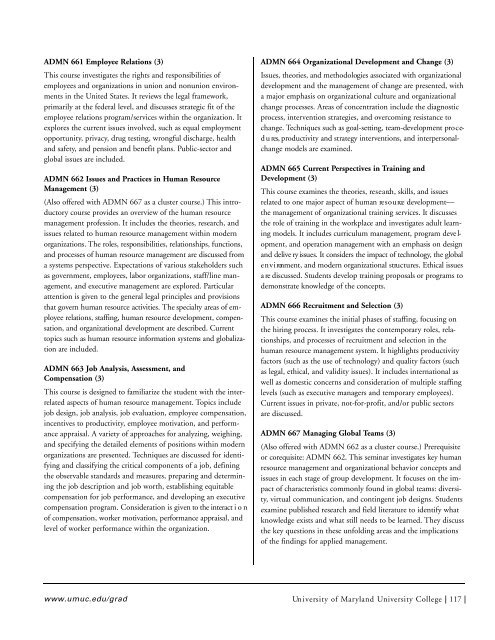A+B. Intro_SJ.1 - University of Maryland University College
A+B. Intro_SJ.1 - University of Maryland University College
A+B. Intro_SJ.1 - University of Maryland University College
Create successful ePaper yourself
Turn your PDF publications into a flip-book with our unique Google optimized e-Paper software.
ADMN 661 Employee Relations (3)<br />
This course investigates the rights and responsibilities <strong>of</strong><br />
employees and organizations in union and nonunion environments<br />
in the United States. It reviews the legal framework,<br />
primarily at the federal level, and discusses strategic fit <strong>of</strong> the<br />
employee relations program/services within the organization. It<br />
explores the current issues involved, such as equal employment<br />
opportunity, privacy, drug testing, wrongful discharge, health<br />
and safety, and pension and benefit plans. Public-sector and<br />
global issues are included.<br />
ADMN 662 Issues and Practices in Human Resource<br />
Management (3)<br />
(Also <strong>of</strong>fered with ADMN 667 as a cluster course.) This introductory<br />
course provides an overview <strong>of</strong> the human resource<br />
management pr<strong>of</strong>ession. It includes the theories, research, and<br />
issues related to human resource management within modern<br />
organizations. The roles, responsibilities, relationships, functions,<br />
and processes <strong>of</strong> human re s o u rce management are discussed from<br />
a systems perspective. Expectations <strong>of</strong> various stakeholders such<br />
as government, employees, labor organizations, staff/line management,<br />
and executive management are explored. Particular<br />
attention is given to the general legal principles and provisions<br />
that govern human re s o u rce activities. The specialty areas <strong>of</strong> emp<br />
l oyee relations, staffing, human re s o u rce development, compensation,<br />
and organizational development are described. Cu r re n t<br />
topics such as human re s o u rce information systems and globalization<br />
are included.<br />
ADMN 663 Job Analysis, Assessment, and<br />
Compensation (3)<br />
This course is designed to familiarize the student with the interrelated<br />
aspects <strong>of</strong> human resource management. Topics include<br />
job design, job analysis, job evaluation, employee compensation,<br />
incentives to productivity, employee motivation, and performance<br />
appraisal. A variety <strong>of</strong> approaches for analyzing, weighing,<br />
and specifying the detailed elements <strong>of</strong> positions within modern<br />
organizations are presented. Techniques are discussed for identifying<br />
and classifying the critical components <strong>of</strong> a job, defining<br />
the observable standards and measures, preparing and determining<br />
the job description and job worth, establishing equitable<br />
compensation for job performance, and developing an executive<br />
compensation program. Consideration is given to the interact i o n<br />
<strong>of</strong> compensation, worker motivation, performance appraisal, and<br />
level <strong>of</strong> worker performance within the organization.<br />
ADMN 664 Organizational Development and Change (3)<br />
Issues, theories, and methodologies associated with organizational<br />
development and the management <strong>of</strong> change are presented, with<br />
a major emphasis on organizational culture and organizational<br />
change processes. Areas <strong>of</strong> concentration include the diagnostic<br />
process, intervention strategies, and overcoming resistance to<br />
change. Techniques such as goal-setting, team-development pro c e-<br />
d u res, productivity and strategy interventions, and interpersonalchange<br />
models are examined.<br />
ADMN 665 Current Perspectives in Training and<br />
Development (3)<br />
This course examines the theories, re s e a rch, skills, and issues<br />
related to one major aspect <strong>of</strong> human re s o u rce deve l o p m e n t —<br />
the management <strong>of</strong> organizational training services. It discusses<br />
the role <strong>of</strong> training in the workplace and investigates adult learning<br />
models. It includes curriculum management, program deve l-<br />
opment, and operation management with an emphasis on design<br />
and delive ry issues. It considers the impact <strong>of</strong> technology, the global<br />
e n v i ronment, and modern organizational stru c t u res. Ethical i s s u e s<br />
a re discussed. Students develop training proposals or programs to<br />
demonstrate knowledge <strong>of</strong> the concepts.<br />
ADMN 666 Recruitment and Selection (3)<br />
This course examines the initial phases <strong>of</strong> staffing, focusing on<br />
the hiring process. It investigates the contemporary roles, relationships,<br />
and processes <strong>of</strong> recruitment and selection in the<br />
human resource management system. It highlights productivity<br />
factors (such as the use <strong>of</strong> technology) and quality factors (such<br />
as legal, ethical, and validity issues). It includes international as<br />
well as domestic concerns and consideration <strong>of</strong> multiple staffing<br />
levels (such as executive managers and temporary employees).<br />
Current issues in private, not-for-pr<strong>of</strong>it, and/or public sectors<br />
are discussed.<br />
ADMN 667 Managing Global Teams (3)<br />
(Also <strong>of</strong>fered with ADMN 662 as a cluster course.) Prerequisite<br />
or corequisite: ADMN 662. This seminar investigates key human<br />
resource management and organizational behavior concepts and<br />
issues in each stage <strong>of</strong> group development. It focuses on the impact<br />
<strong>of</strong> characteristics commonly found in global teams: diversity,<br />
virtual communication, and contingent job designs. Students<br />
examine published research and field literature to identify what<br />
knowledge exists and what still needs to be learned. They discuss<br />
the key questions in these unfolding areas and the implications<br />
<strong>of</strong> the findings for applied management.<br />
w w w. u m u c . e d u / g r a d<br />
Un i versity <strong>of</strong> Ma r yland Un i versity <strong>College</strong> | 117 |

















